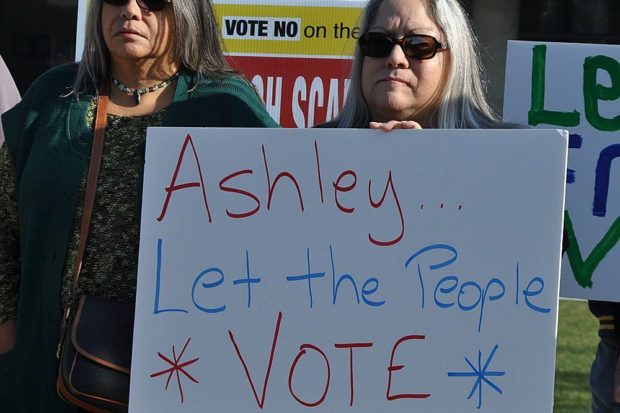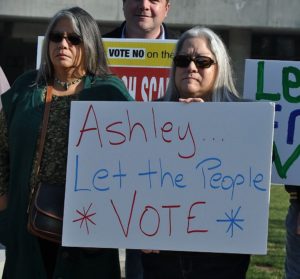
By Michael D. Evans

At the time of our press deadline, opponents of Mayor Ashley Swearengin’s plan to privatize the City of Fresno’s residential sanitation service had just delivered about 40,000 signatures to City Hall in a Referendum Against Fresno City Ordinance #2012-26. The number of signatures was almost twice the nearly 22,000 required to force a referendum on the ordinance.
By any measure, this was an amazing achievement against near-impossible odds. Swearengin had engineered the passage of the privatization measure so that it would take place at the end of the term for the outgoing City Council (those serving through the end of 2012), which meant that she had a friendly majority for her viewpoint. The vote was rushed—without adequate public input and with many unanswered questions, including the potential environmental impact of the decision (see sidebar).
Swearengin pushed the measure quickly because of her uncertainty as to what might happen with the new City Council, seated in early January 2013. Exiting members Andreas Borgeas and Larry Westerlund both supported the measure, and Borgeas’ replacement, Steve Brandau, clearly supports it as well. That left uncertainty as to the position of Westerlund’s successor, Paul Caprioglio. As of press time, Caprioglio had yet to state his position on the issue.
“It is sad that Council Members Westerlund, Borgeas, [Lee] Brand and [Clint] Olivier rushed to give Mid-Valley Disposal a nice Christmas present at the expense of over 100,000 households in Fresno,” noted retired attorney Howard Watkins in a recent letter to the Fresno Bee. “While the City is in a financial bind, the problem is not caused by the self-funded sanitation department.”
The timing of the vote was ideal from the mayor’s perspective for minimizing the likelihood of a large-scale petition-gathering effort. The signatures had to be solicited within 30 days of the City Council vote, and that meant the time frame included the Christmas and New Year’s holiday period.
But Fresno is no longer the sleepy, deferential and deeply right-wing place that we have often been led to believe it is. People who are otherwise rarely engaged in our public discourse were incensed by the mayor’s power play. Yes, paid signature gatherers were engaged. Under the circumstances, that was a prudent decision. But talk of that obscures the real story—that hundreds of individuals throughout Fresno volunteered to meet with their neighbors and stand in supermarket parking lots to educate voters and secure signatures and, improbable though it may seem, activist groups in Fresno came up with the funding to hire those aforementioned paid signature gatherers and to fund the environmental challenge.
That brings us to Swearengin’s response. She determined that democratic feedback had no place in our community and coordinated an aggressive campaign to misinform the public about the petition effort, engage in name calling, use intimidation tactics against signature gatherers, threaten city employees with dismissal and waste public funds (that’s right, those “scarce” public funds) advocating her position. She was assisted in this effort by Mid-Valley Disposal, the soon-to-be recipient of the City’s largesse; a group calling itself Fresnans for Responsible Government (FRG); and the Central Valley Tea Party.
In a radio spot by the mayor, apparently financed by the City, she calls the measure “a win-win for everyone. But now labor union bosses have hired a Sacramento company to collect signatures to overturn this change.”

A robo call paid for by FRG’s Issues Committee took the same tack, alleging that “the big public labor union bosses have hired out-of-town signature collectors to file petitions to overturn this change, even though that means your trash rates would go back up, and we’d lose money for police and fire services.”
“The City has continued to portray this as a labor issue, and the mayor has made derogatory remarks about ‘labor union bosses,’” notes Dee Barnes, president of the Fresno City Employees Association. Indeed, “labor union bosses” is used by the ordinance’s proponents in such a way as to imply an On the Waterfront caricature of labor leadership.
Just who is Fresnans for Responsible Government? Every Board member listed on the group’s Web site is a Republican. Although the Board members are based in Fresno, the entity behind the group is not. The Web site and apparently the media campaigns are handled by JC-Evans, Inc., a Republican media consulting firm based in Sacramento County, which is decidedly “out of town.” Jeff Evans, president and CEO of JC-Evans, has served as editor of the California Republican for more than a decade.
“They may never admit it,” notes Barnes, “but this has really been about the Republican agenda of downsizing government and outsourcing as much as possible.”
And Pam Whalen, chair of the Central Valley Progressive PAC, calls “privatization the Republican version of raising taxes.”
Moreover, if the past 30 years have taught us anything, it is that Republicans are suspect stewards of our public treasury. Witness the administrations of George W. Bush, Ronald Reagan, Arnold Schwarzenegger and Alan Autry at the national, state and local levels. Doubling down on the policies that led to our fiscal crises is hardly a “responsible” panacea.
Then there is the Central Valley Tea Party, which distributed a flyer that stated: “Patriots please report all sightings of petitioners collecting signatures on the Fresno City trash privatization issue.” New City Council Member Brandau touted on his campaign Web site that he is the “head coordinator” of the local Tea Party. And the contact on this flyer is Neil O’ Brien, the Fresno State student who hounded then student body president Pedro Ramirez for months over his immigration status.
One of the mail pieces financed by the FRG Issues Committee claims that “Mayor Swearengin and the City Council have streamlined government, cut spending, and made City Hall more accountable.”
Yet, Barnes says that “it has been difficult to get all employees or labor groups on board when the mayor and City management continue to do what they want and make decisions behind closed doors.
“The city should not be creating a new general fund revenue stream on the backs of 150 employees and by charging ratepayers a 15% fee on their trash service,” says Barnes. “If the General Fund is in trouble, allow the citizens of Fresno to have all of the facts and allow them to help decide the best solution.”
Delivery of the petitions is an excellent first step, but the battle is far from over. First, the signatures will be reviewed to confirm that there is the minimum number of valid signatures. If that threshold is met, then the City Council could vote to rescind the ordinance. Failing that, the ordinance will go to a public vote. If that should happen, we can anticipate an incredibly well-financed and nasty campaign to sustain the ordinance.
The mayor and the city manager continue to perpetuate the fiction that privatization is the only way to solve our fiscal crisis. But what we can say with certainty is that city employees are not the problem. There is, however, a desperate need for an open and transparent discussion of our city’s fiscal woes. At a minimum, every City Council member should be given access to any and all information that would assist them in proposing solutions. Even better would be to make this information available to the public and to establish a citizens’ forum to find solutions.
*****
Michael D. Evans is a political activist, editor and writer. Contact him at evansm@usa.net.
